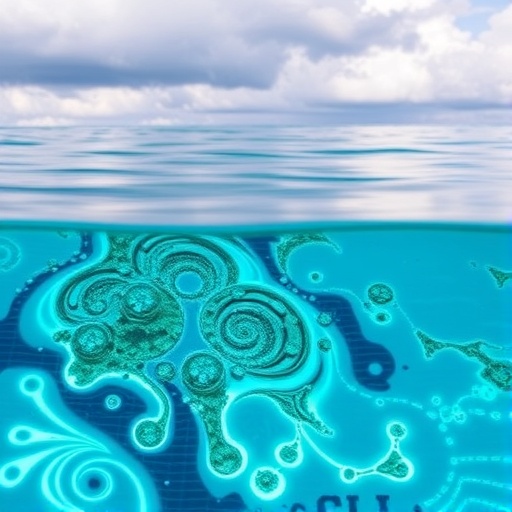In a groundbreaking study, researchers led by P.J. van Hengstum, alongside collaborators S.N. Little and R.M. Sullivan, investigate the intricate interplay of environmental processes that have shaped the Caribbean water balance over the Common Era. This fascinating inquiry sheds light on the multifaceted historical dynamics that influence present-day water resources, offering vital insights into the ongoing challenges posed by climate variability and anthropogenic influences.
At the core of the research lies the concept of “time-transgressive forcing,” a term that encapsulates the gradual yet profound impacts of various natural forces on the hydrological cycle within the Caribbean region. Through meticulous analysis of sediment cores and water isotopy, the team has been able to trace the fluctuations in water balance, revealing how these changes correlate with major climatic events and shifts in sea level.
A vital aspect of this study is the calibration of historical data against modern climate models. By employing advanced statistical techniques, the researchers effectively bridged the gap between past climates and current water regimes. This approach not only confirmed long-held theories about the Caribbean’s climatic history but also unveiled surprising new patterns that challenge existing paradigms.
The Caribbean, with its diverse ecosystems, plays a crucial role in global climate regulation. Thus, understanding its water balance is imperative for ecological sustainability. The study highlights how variations in precipitation, evaporation, and freshwater flow have historically interacted with oceanic and atmospheric changes, creating a complex network of hydrological responses that are still poorly understood.
In addition to natural processes, the researchers also examined anthropogenic factors that have influenced Caribbean water balance. The impacts of agriculture, urbanization, and tourism cannot be understated; these activities have altered the landscape and consequently affected natural water cycles. The findings make a compelling case for the urgent need to mitigate human impacts while developing adaptive management strategies to protect these vital resources.
The paper underscores the role of extreme weather events, which have become more frequent due to climate change, in further destabilizing the water balance in the region. The researchers point out alarming trends in storm intensity and rainfall variability, which have profound implications for water supply and distribution in Caribbean communities. Such insights are crucial for policymakers aiming to implement effective disaster preparedness and response strategies.
Another key element of the research is the identification of thresholds beyond which the Caribbean water balance can enter a state of crisis. These thresholds, which have been illuminated through data modeling, indicate the critical points at which natural systems can become overwhelmed. This offers a valuable tool for environmental management, as it emphasizes the importance of proactive measures taken before reaching these tipping points.
The research also reflects on the implications of these findings for future climate scenarios. As the Caribbean faces the dual challenges of rising sea levels and altered weather patterns, understanding past water balance dynamics can provide clues for future resilience. The insights gleaned from this study can guide the development of sustainable practices that harmonize human needs with environmental stewardship.
Furthermore, the interdisciplinary nature of the study, blending climatology, hydrology, and environmental science, shows the value of collaborative research in tackling complex global challenges. By including diverse expertise, the team has created a holistic view of the interdependencies within the Caribbean ecosystem, emphasizing that solutions must also be multifaceted and inclusive.
The results of this research are timely and essential as the world grapples with the escalating impacts of climate change on society and natural systems. Communities across the Caribbean rely on stable water supplies not only for drinking and agriculture but also for maintaining biodiversity and economic stability. The findings deliver a clarion call to embrace sustainable practices that account for the complex realities of climate variability and human activity.
In conclusion, these revelations about the historical and contemporary water balance in the Caribbean underscore the necessity for urgent action. The study by van Hengstum & colleagues is a pivotal contribution to our understanding of how environmental and anthropogenic forces can converge to impact water resources. As global climates continue to evolve, this research serves as a cornerstone for developing strategies that will ensure future water security in the Caribbean.
Through a lens of science and urgency, this work invites not only the scientific community but also local governments, NGOs, and communities to engage in dialogues that foster resilience against the backdrop of a changing climate. The protection and sustainable management of Caribbean water resources is not merely a local issue; it resonates on a global scale, influencing ecological health and climate stability across the planet as we seek pathways toward a sustainable future.
Subject of Research: Caribbean water balance dynamics during the Common Era.
Article Title: Common Era time-transgressive forcing of Caribbean water balance.
Article References:
van Hengstum, P.J., Little, S.N., Sullivan, R.M. et al. Common Era time-transgressive forcing of Caribbean water balance. Commun Earth Environ 6, 954 (2025). https://doi.org/10.1038/s43247-025-02905-x
Image Credits: AI Generated
DOI: https://doi.org/10.1038/s43247-025-02905-x
Keywords: Caribbean, water balance, climate change, time-transgressive forcing, hydrological cycle, environmental management, resilience.




